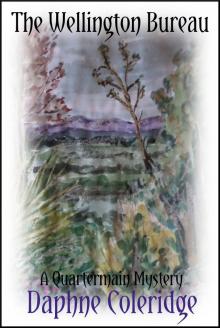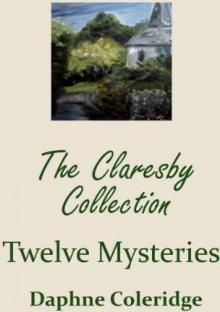- Home
- Daphne Coleridge
The Wellington Bureau: A Quartermain Mystery Page 2
The Wellington Bureau: A Quartermain Mystery Read online
Page 2
the students were soon talking amongst themselves whilst their guest sucked at his pipe in silence. After nearly half an hour, the professor having failed to return, the man turned to Anna, who was now seated on his immediate right, the intervening person having left.
“The tttt’trouble with making conversation,” he began, “is that everyone likes to tt’talk but no one wants to listen. Your friends are polite. They t’take it in turns. They put up a pretence of listening until it is their turn to speak. Most commendable.”
Anna was not sure how to reply, so she settled for a smile.
“I don’t mean to seem impolite myself,” continued the historian. “I will gladly talk. Would you prefer gardening or more history? Or would you prefer me to listen to a subject of your choice?”
Anna elected to hear about gardening. Quartermain told her about his pink roses, the nice hedgehog he had recently found, and the fact that the vine he had known since it was a pip was really coming along rather nicely. Anna listened with amusement. She was not interested in gardens, but he spoke with a wry humour which mocked his own delight in being allowed to talk about his small horticultural triumphs, which made her smile.
“Do you like flowers, my dear?” he enquired at last.
Anna admitted that you could not recall having noticed any in recent weeks.
“No, it is a sad time for gardens. But I do have some nice chrysanthemums. And some late roses. Silly things! I'll send you some.”
“I’m sorry you were lumbered with him,” said the president of the society, a lean, insipid youth whom Anna particularly disliked, after the professor had retrieved his friend.
“Mr Quartermain? I rather liked him.”
“Lord Augustus Quartermain, if you please! He’s a viscount or something. But a boring old duffer all the same. The Prof. said history is his hobby. I suppose he doesn’t need to worry about earning a crust like the rest of us.”
Even the professor apologised to Anna.
“I hear that you were stuck with Andrew last night. He’s a decent enough chap. A bit eccentric.”
“I liked him.”
“Did you? That’s good. He said he’d been telling you about his latest article. Something about Napoleon and his barges, eh? Sounds dull even to me.” The professor guffawed at his own joke.
The next day some flowers and a copy of the article, hand-written and illegible, arrived in the history department addressed: “To the nice dark-haired girl – A.A.Q.”
Anna read the article, put the flowers in a vase, and then, after a considerable amount, of thought, wrote a short note – “A.A.Q. You can no more keep to the point when you write than when you speak. Perhaps you should try a few illustrations. I can find no fault with the flowers. Anna.”
She gave the note to the professor and asked him to forward it to his friend.
She heard no more. Then, a fortnight later, he appeared in her halls of residence. He was in his early forties with clever blue eyes which crinkled at the edges when, not infrequently, something amused him; and blond hair which fell over his eyes whenever something excited him. He was only a little taller that Anna herself, but broad shouldered. His tweedy clothes and his mannerisms gave the impression that he was older than he really was. Anna thought him rather attractive.
Andrew had sat in her room, drinking coffee, looking at her bookshelf, asking her to help him finish a crossword. Another time he brought some port and two glasses, explaining that he would not enjoy it out of a mug. He had also brought a bunch of chrysanthemums and a vase to put them in, some paints and paper; and he proceeded to paint the flowers whilst Anna finished her essay. He then read the essay, laughed at her respectful references to various historians as “authorities”, drank some cocoa and left.
The third time he came he seemed ill at ease. He spoke more than usual and stuttered a lot.
“Are you enjoying yourself here,” he asked.
“No,” she replied.
“Are you ambitious?”
"No."
“Would you enjoy a quiet life?”
“I think so.”
“Is there any reason why you would dd’dislike the idea of marrying me?”
Anna thought for a moment. Andrew’s few brief visits had made her realise how lonely she had been, how devoid of purpose her life.
“I have this little girl, you see. Emma.”
“Your daughter?” asked Anna.
“Yes.”
“How old.”
“I’ve not counted. Only months.”
“Why not get a nanny?”
“Well, I thought we would get along rather well.”
“Yes, I think we might.”
They had got on very well. For the best part of five years they had lived together in Quartermain House, a fine seventeenth century building with large, bright rooms and several acres of grounds, which included the walled rose garden so dear to Andrew’s heart. They had pottered about the gardens which were tended so lovingly by the ailing but likeable Jack assisted by his simple, but equally likeable son, Sam. They had read books from the library. In the spring they sat in the conservatory and read, in the summer that sat in the garden, and in the winter they sat in front of a roaring fire in the library itself. Andrew had started to teach her Latin and they had reconstructed various historical battles with his vast collection of toy soldiers. She had shared his dislike of visitors. They never entertained – to the silent relief of Douglas. The only person Andrew had any time for was Brigadier Butterworth. Toby dropped in every now and then, usually to borrow money from his father, but he soon learnt not to bring his friends. Apart from these few distractions, they were fully occupied with the care of little Emma.
Anna was not surprised that Toby’s mother had left Andrew after two years of marriage. She was only surprised that she had put up with him so long. It was a fact she could not explain. He had none of the virtues required to make a marriage endurable. He was not prepared to compromise on anything. He would talk only if he was interested in a subject. He did only what he enjoyed. He loved peace and solitude and would only venture out of his house if it pleased him to do so. He would not even trouble to be courteous to anyone imprudent enough to visit them. Few people did, although Anna’s brother, despite repeated warnings, made one attempt. As a lover she found him neither romantic nor passionate. He was not even especially considerate. He was, however, evidently quite fond of her and the marriage was a success simply because they were in accord in every particular. She shared both his likes and his dislikes. She did not even object to his habit of playing a piece of music over and over again. She actually grew to like Mozart's Requiem after hearing it for the fifth time on their honeymoon, which was spent at Quartermain House. So, the long, happy years of peace and security had stretched out before them. And then he had been killed and little Emma with him.
Anna went and opened the window. She would have to leave Quartermain House soon. After all, it belonged to the new viscount now. She would no doubt have plenty of money. There was no need for her to get a job. And Emma was gone. There was no one for her to look after, no need to make an effort. In short, there was nothing for her to do. No need to live, nothing to live for. She wished she could die. She thought of killing herself, but it seemed such a selfish, self-pitying thing to do. So useless. As wasteful as Emma’s death. There was as little point in dying as there was in living. She sighed, closed the window again, and lay wearily but open-eyed on the bed.
Two
Anna had been staying with her brother for over a month. She spent her time helping to look after her two small nieces, Louise and Jennifer, or simply sitting in the sun feeling anything from melancholy to desolate. She hated the small suburban semi which seemed to her so cramped and claustrophobic after Quartermain House. She hated herself for being so ungrateful, in view of the considerable sacrifices that had been made by all the Walker family in order to make her comfortable. Jennifer had given up her bedroom for her, and the two girls and all t
heir things were cramped into one small room. There had been many quarrels as a result. Louise didn’t see why her sister should put toys in her cupboard. Jennifer felt that, having given up her cupboard for her aunt’s use, she had a right to half her sister’s. A doll was thrown out of the window and the face battered flat in the ensuing squabble. Both girls were punished by their mother for behaving so badly when “poor Aunt Anna” was in the house.
Anna felt guilty for the disruption her presence caused, guilty about her frequent phone calls to Douglas to see how the cats, dogs, and roses were, and guilty because she found herself despising the narrow, routine life of her brother and his family. After all, if she hadn’t happened to marry Viscount Quartermain, she would probably have been living in a three-bedroom house with two quarrelsome children and another such work-obsessed mediocrity as her brother for a husband. She certainly could not have been less happy than she was. All she had was a title, which she would have been embarrassed to use, and money – which was equally embarrassing, just as useless in the circumstances, and just as little deserved.
Anna decided that it was time she found herself a house of her own, if only to cease to be a burden to the Walkers and to get away from her brother’s repeated insistence that she should find herself a useful job, and his wife’s repeated insistence that she should remarry as soon as possible. She planned to go and

 The Wellington Bureau: A Quartermain Mystery
The Wellington Bureau: A Quartermain Mystery The Claresby Collection: Twelve Mysteries
The Claresby Collection: Twelve Mysteries